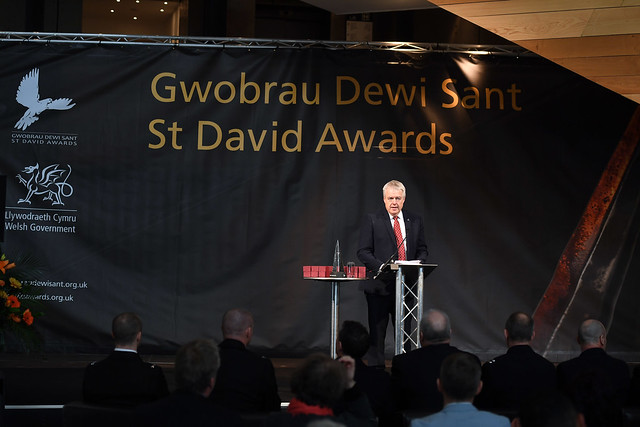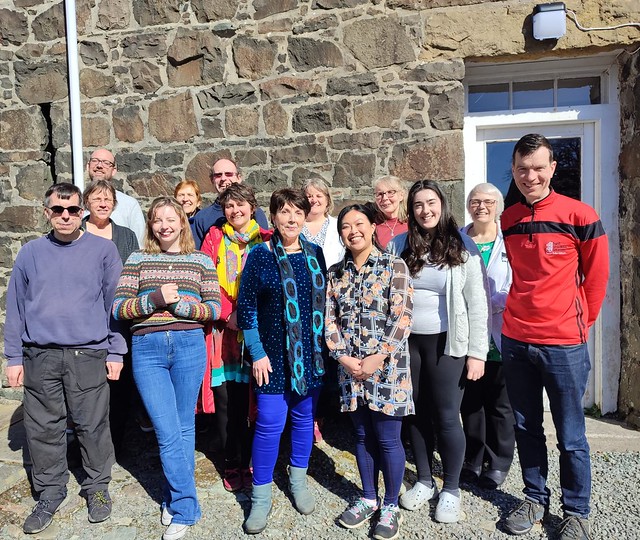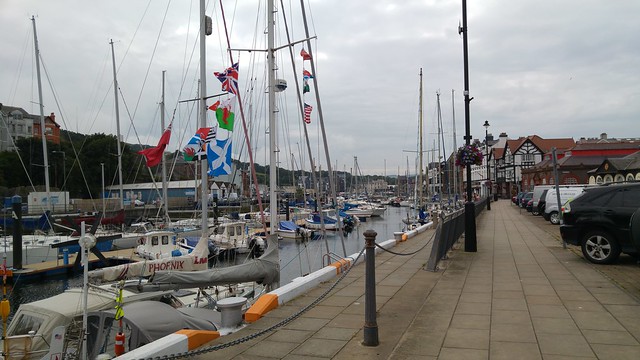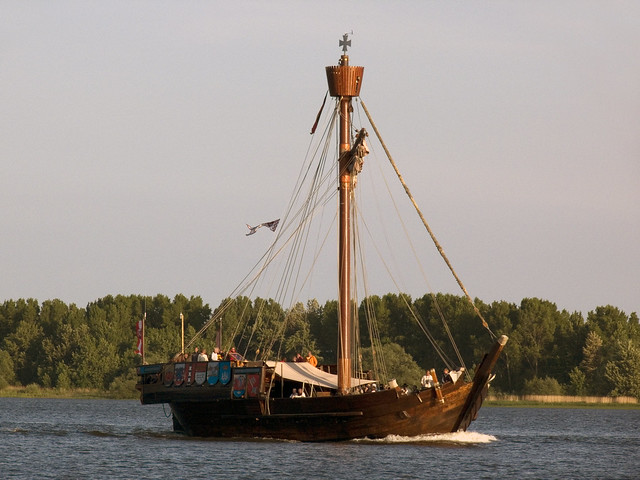Words for sure, certain and related words in Celtic languages.
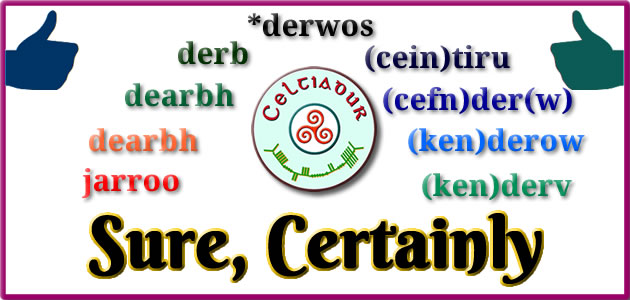
Words marked * are reconstructions.
| Proto-Celtic | *derwos = firm (as an oak), oak |
|---|---|
| Old Irish (Goídelc) | derb = sure, certain, fixed, certainty derba = certainty derbaid = to certify, confirm, prove derbda = certain, fixed |
| Middle Irish (Gaoidhealg) | derb = sure, certain, fixed, determinate, reliable, genuine derba = certainty derbaid = to certify, confirm, prove, attest derbda(e) = certain, fixed |
| Irish (Gaeilge) | dearbh [ˈdʲaɾˠəvˠ] = sure, certain dearbhaigh = to declare, affirm, confirm, attest, prove dearbháil = to test, check dearbhú = declaration, affirmation, attestation, confirmation dearfa = attested, proved, sure, certain dearfach = affrimative, positive dearfacht = positiveness, certainty deartháir = brother (“certain brother” from derb & bráthair [brother]) deirfiúr = sister (“certain sister” from derb & siur [sister]) |
| Scottish Gaelic (Gàidhlig) | dearbh [dʲɛrɛv] = ceratin, sure, positive dearbh-aithne = identity, indentification dearbhaich [dʲɛrɛvɪç] = prove, attest, verify, demonstrate dearbhadh [dʲɛrɛvəɣ] = proving, attesting, verifying dearbhachd [dʲɛrɛvəxg] = proof, experience, assurance dearbhair [dʲɛrɛvɛrʲ] = affirmer, checker dearbhte [dʲɛrɛvdʲə] = ascertained, confirmed, proved dearbhach [dʲɛrɛvəx] = sure, affirmative, positive dearbhachail [dʲɛrɛvəxal] = conclusive, decisive |
| Manx (Gaelg) | jarroo = absolute, actual, even, explicit, express, identical, indubitable jarrooagh = affirmative, categorical, confirmative, definitive, positive jarrooid = positiveness dy jarroo = actually |
| Old Welsh | ceintiru = first cousin (male) |
| Middle Welsh (Kymraec) | keuynderv, keuyndyru, keuynderw = first cousin (male) cyfnitherw, kefnithderw, cyvnither = first cousin (female) |
| Welsh (Cymraeg) | derw = sure, true (only appears in words below) cefnder(w) = first cousin (male) cyfnither(w) = first cousin (female) |
| Middle Cornish (Cernewec) | handeru = first cousin |
| Cornish (Kernewek) | kenderow, keniterow = cousin |
| Middle Breton (Brezonec) | quenderu = cousin |
| Breton (Brezhoneg) | kenderv = cousin (male) keniterv = cousin (female) |
Etymology: from the Proto-Indo-European *drewh₂- (steady, firm), from *dóru (tree), which possibly related to *deru-/*drew- (hard, firm, strong, solid) [source].
Words from the same roots include words for oak trees in Celtic languages, and tar, tree, trough and trim in English [source].
| Proto-Celtic | *kengeti =to step |
|---|---|
| Old Irish (Goídelc) | cingid [ˈkʲiŋʲɡʲiðʲ] = to step, proceed do·cing = to advance, step forward |
| Middle Irish (Gaoidhealg) | cingid, cinnid, cinnit = to step, pace, proceed, go, overcome, surpass, excel, exceed do-cing, to-cing = to step, stride forward, advance, come |
| Irish (Gaeilge) | cinn [cəiɲ / ciːnʲ] = to fix, determine, decree, decide cinnte = certain, definite, mean, stingy, constant cinnteach = fixed, definite, definitive cinnteachaí = determinist cinnteachas = determinism cinnteacht = certainty, stinginess, limitation cinntigh = to make certain, confirm, assure cinntiú = confirmation, determination |
| Scottish Gaelic (Gàidhlig) | cinnt [kʲĩːn̪ʲdʲ] = certainty cinnteach = certain, definite, sure, accurate cinnteachas = determinism cinnteachd = certainty, actuality, assurance cinnteachadh = checking, confirming, determining cinntich = (to) check, confirm, determine, ascertain |
| Manx (Gaelg) | kinjagh = constant, continual, continuous, definite |
Etymology: possibly from Proto-Indo-European *(s)keng- (limp) [source].
Words from the same roots include words for step in Celtic languages, shank in English, hinken (to limp, hobble) in Dutch and German [source].
| Middle Welsh (Kymraec) | dyogel, diogel = safe, secure, certain, sure, reliable, immovable diogelu = to make save, secure diogelhay = to make safe or fast, secure, assure diogelrwydd, diogelrỼyd = safety, security, assurance, certainty diogelwch = safety, security, caution diogelwr = defender, protector |
|---|---|
| Welsh (Cymraeg) | diogel [dɪˈɔɡɛl/dɪˈoːɡɛl] = safe, secure, certain, sure, reliable, immovable diogelaf, diogelu = to make save, secure, assure, confirm diogeldeb, diolgelder = safety, security diogelfa = safe place, fortress, stronghold, place of refuge diogelhaf, diogelhau = to make safe or fast, secure, assure diogelrwydd = safety, security, assurance, certainty diogelwch = safety, security, caution diogelwr, diogelydd = defender, protector |
| Middle Cornish (Cernewec) | diogel, dyowgel, dyogel, diûgel, diougel = unexposed, secure, safe, certain |
| Cornish (Kernewek) | diogel = certain, reliable, secure, sure diogeldeh = security diogeli = to safeguard, secure |
| Middle Breton (Brezonec) | diouguel, dioguel, dyougel = certain, sure, surely, security, safety diouguelhat = to defend, guard, protect diouguelroez, dyouguelroez = security, protection |
| Breton (Brezhoneg) | diogel [diˈoːɡɛl] = size, dimension, measure, format diougelaat = to defend, guard, protect diougeladur = affirmation, assertion diougeler = protecter diogeliñ = to assert diogelroez = security, protection diogelus = affirmative |
Etymology: from di- (intensifying prefix) and gogel (to guard), from Proto-Celtic *uɸo- (sub-, under) and *kelo (to hide), from PIE *ḱel (to cover) [source].
Words from the same roots include Celt(ic), heel and occult in English [source].
| Scottish Gaelic (Gàidhlig) | sicir [ʃiçgʲɪrʲ] = shrewd, acute, accurate, sure sicireachd [ʃiçgʲɪrʲəxg] = shrewdness, acuteness, accurateness, sureness |
|---|---|
| Manx (Gaelg) | shickyr = certain, confident, definite, firm shickyraghey = to ensure, ratify, verify, affirmation shickyrys = assurance, certainty, security, stability |
| Middle Welsh (Kymraec) | sicr, sikr = safe, secure, certain, sure, reliable, immovable sickrwydd, sicrwydd, siccrwydd = certainity, sureness, assurance siwr, sywr = sure, certain, inevitable, unfailing |
| Welsh (Cymraeg) | sicr [ˈsɪkɪr] = sure, certain, inevitable, secure, safe sicrhau = to ensure, make certain, fasten, secure sicrwydd = certainity, sureness, assurance siŵr, siwr [ʃuːr]= sure, certain, inevitable, unfailing siwr(i)af, siwr(i)o = to assure, ensure siwrans, siwrens = certainity, assurance |
| Middle Cornish (Cernewec) | secer = secure secerder = security |
| Cornish (Kernewek) | sur = certain(ly), sure(ly) surhe = to assure, ensure, insure surheans = insurance surneth = certainity surredi = certainly, surely |
| Middle Breton (Brezonec) | sigur = sure, certain, assured |
| Breton (Brezhoneg) | sygur, sigur [ˈsiːɡyr] = sure, certain, assured siguriñ = to generalize, pretext |
Etymology: from Middle English siker (safe, secure), from Old English sicor (secure, safe, sure), from Proto-West Germanic *sikur (secure, safe, sure, certain), from Latin sēcūrus (worryless; carefree; secure), from sē- (without) and cūra (care); [source].
Note: the Welsh word sikr comes from Middle English siker, while siŵr/siwr comes from modern English sure. They both come from the same ultimate roots. Similarly, the Middle Cornish secer comes from Middle English, while sur in modern Cornish comes from modern English. I’m not sure if the Breton words are related, or what their etymology is.
Sources: Wiktionary, Am Faclair Beag, Online Manx Dictionary, Teanglann.ie, eDIL – Electronic Dictionary of the Irish Language, In Dúil Bélrai English – Old Irish glossary, Geiriadur Prifysgol Cymru, Gerlyver Kernewek, Gerlyvyr Cernewec, Lexicon Cornu-britannicum: A Dictionary of the Ancient Celtic Language of Cornwall, Dictionaire Favereau, TermOfis, Le dictionnaire diachronique du breton, Geriafurch, English – ProtoCeltic WordList (PDF), Etymological Dictionary Of Proto Celtic



